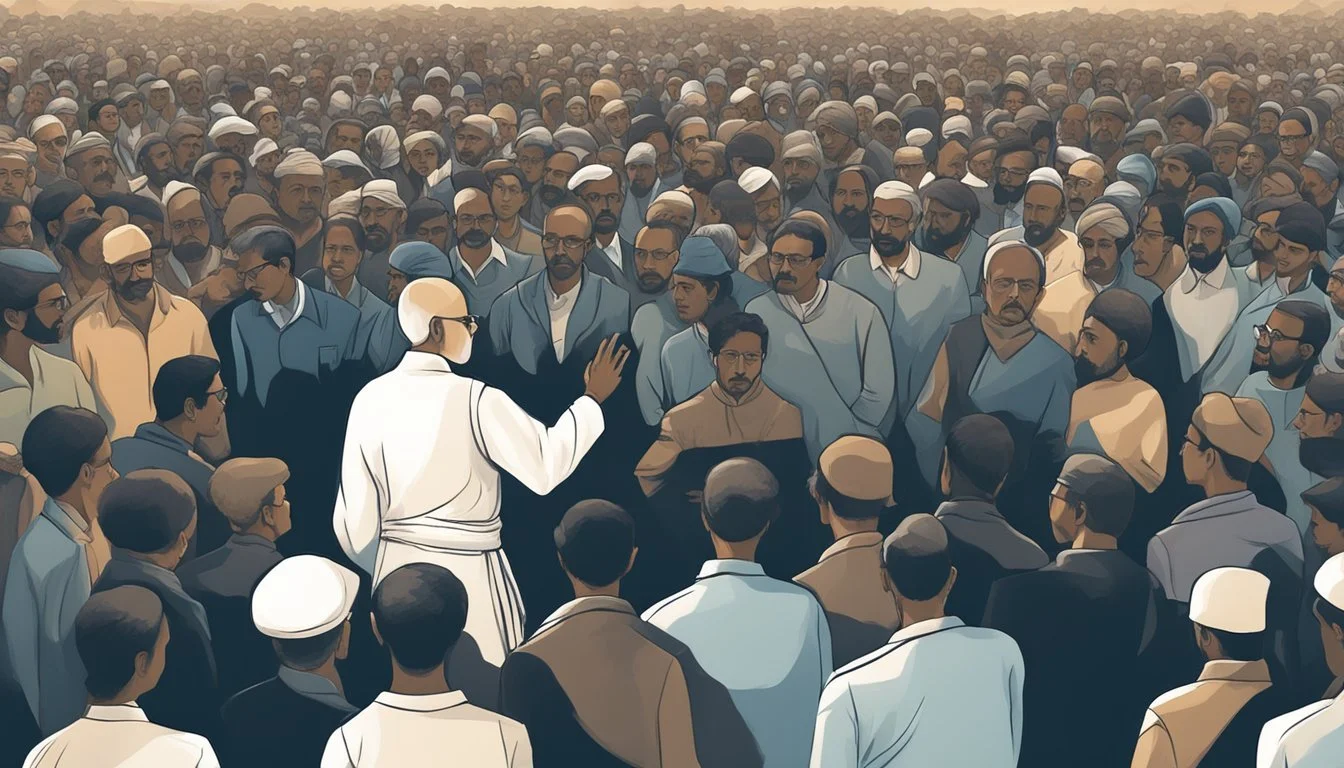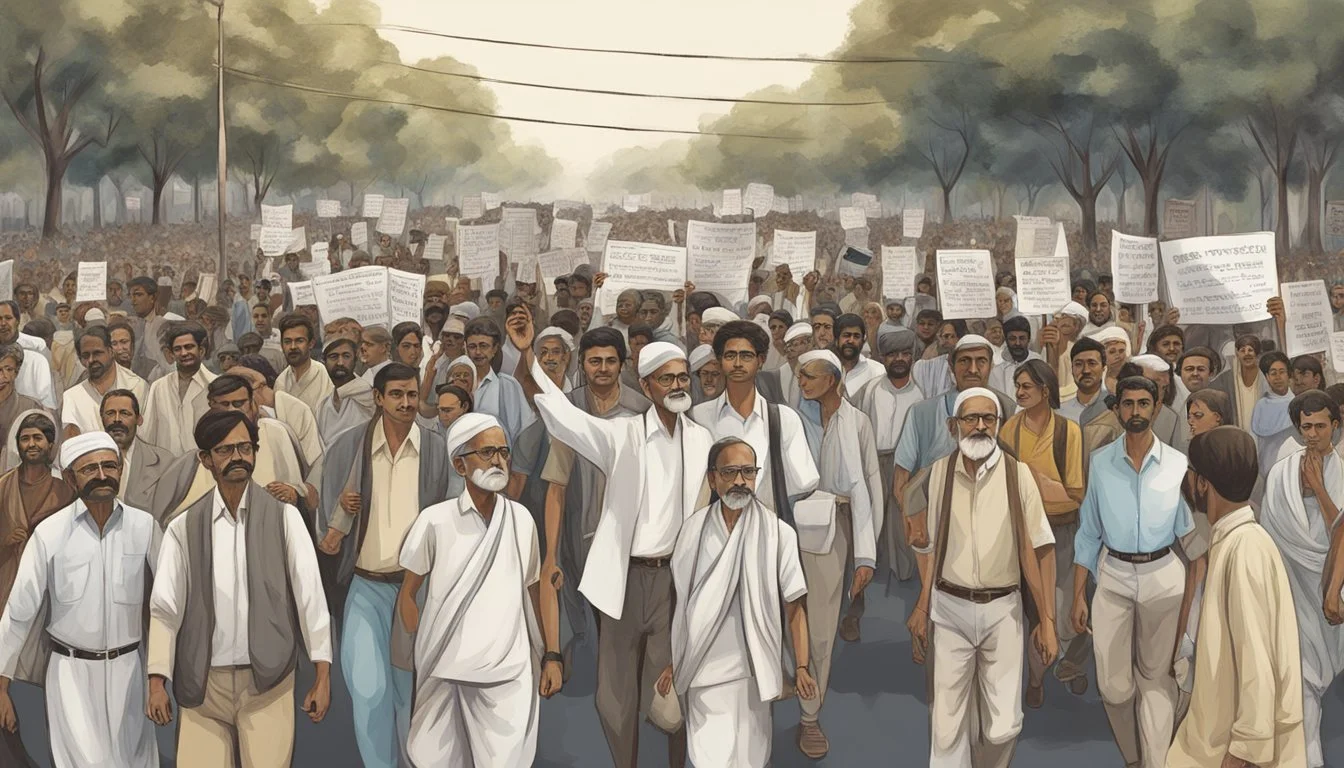7 Powerful Documentaries on Gandhi's Life and Assassination
Exploring the Legacy of India's Iconic Leader
Mahatma Gandhi's life and legacy continue to captivate and inspire people around the world. As a pivotal figure in India's struggle for independence and a champion of non-violent resistance, Gandhi's philosophy and actions have left an indelible mark on history. Documentaries offer a powerful medium to explore the depth and complexity of his journey.
These seven documentaries provide viewers with compelling insights into Gandhi's life, his principles, and the circumstances surrounding his assassination. From his early years in South Africa to his role in India's freedom movement, these films shed light on different aspects of Gandhi's remarkable story. Through archival footage, interviews, and expert analysis, they offer a nuanced portrayal of the man known as the Father of the Nation.
1) 'Mahatma Gandhi: Father of a Nation' by Richard Attenborough
Richard Attenborough's 'Gandhi' is a landmark biographical film released in 1982. The movie chronicles the life of Mahatma Gandhi, portraying his journey from a young lawyer to the leader of India's non-violent independence movement.
Ben Kingsley delivers a powerful performance as Gandhi, capturing the essence of the iconic figure. The film meticulously recreates historical events, including the Salt March and the Partition of India.
Attenborough's direction brings Gandhi's philosophy of non-violence and civil disobedience to life on screen. The movie emphasizes Gandhi's struggle against British colonial rule and his efforts to promote unity between Hindus and Muslims.
'Gandhi' received critical acclaim and won eight Academy Awards, including Best Picture and Best Director. It remains a significant cinematic tribute to the life and legacy of Mahatma Gandhi.
The film begins with Gandhi's assassination and funeral, then goes back in time to explore his early years and the development of his political and spiritual beliefs. It offers viewers a comprehensive look at Gandhi's life and the impact of his teachings.
[https://en.wikipedia.org/wiki/Gandhi_(film)]
2) 'Gandhi' by Lord Richard Attenborough
'Gandhi' is a monumental biographical film directed by Richard Attenborough in 1982. It chronicles the life of Mahatma Gandhi from his early days as a lawyer in South Africa to his pivotal role in India's independence movement.
Ben Kingsley delivers a powerful performance as Gandhi, capturing the leader's essence and philosophy. The film showcases Gandhi's commitment to non-violence and his journey as a political and spiritual leader.
Attenborough's direction brings to life key moments in Gandhi's struggle against British rule. The movie depicts historical events such as the Salt March and the Partition of India with authenticity and emotional depth.
The film's epic scale is evident in its portrayal of mass movements and political upheavals. It also delves into Gandhi's personal life, including his relationship with his wife Kasturba, played by Rohini Hattangadi.
'Gandhi' received widespread critical acclaim and won eight Academy Awards, including Best Picture and Best Actor for Kingsley. It remains a definitive cinematic portrayal of the Mahatma's life and legacy.
3) 'The Making of the Mahatma' by Shyam Benegal
'The Making of the Mahatma' is a 1996 biographical film directed by Shyam Benegal. The film explores Mahatma Gandhi's formative years in South Africa, spanning from 1893 to 1914.
Rajit Kapoor portrays the young Gandhi, capturing his transformation from a timid lawyer to a confident leader. The story is based on Fatima Meer's book "The Apprenticeship of a Mahatma."
The film delves into Gandhi's experiences with racial discrimination and his development of nonviolent resistance. It showcases pivotal moments that shaped his philosophy and activism.
'The Making of the Mahatma' was a joint production between India and South Africa. This collaboration adds authenticity to the portrayal of Gandhi's time in South Africa.
The movie provides insight into Gandhi's personal life, including his relationship with his wife Kasturba, played by Pallavi Joshi. It also depicts his interactions with various influential figures of the time.
https://en.wikipedia.org/wiki/The_Making_of_the_Mahatma
4) 'Mahatma Gandhi: The Great Soul' by National Geographic
'Mahatma Gandhi: The Great Soul' is a compelling documentary produced by National Geographic. It offers a comprehensive look at Gandhi's life and his profound impact on India's independence movement.
The film explores Gandhi's early years, including his time as a lawyer in South Africa. It delves into his development of non-violent resistance and its application in the Indian struggle for freedom.
Gandhi's key campaigns are highlighted, such as the Salt March and the Quit India Movement. The documentary also examines his philosophy of satyagraha and its influence on civil rights movements worldwide.
Through archival footage and expert interviews, the film paints a vivid picture of Gandhi's leadership and personal sacrifices. It showcases his commitment to social justice and equality, including his efforts to uplift the untouchable caste.
The documentary concludes with Gandhi's assassination and its aftermath. It reflects on his enduring legacy as a symbol of peace and non-violent activism.
National Geographic - Mahatma Gandhi: The Great Soul
5) 'Gandhi, My Father' by Feroz Abbas Khan
Released in 2007, 'Gandhi, My Father' is a biographical drama that offers a unique perspective on Mahatma Gandhi's life. The film focuses on the complex relationship between Gandhi and his eldest son, Harilal.
Directed by Feroz Abbas Khan, the movie stars Darshan Jariwala as Mahatma Gandhi and Akshaye Khanna as Harilal Gandhi. Shefali Shah portrays Kasturba Gandhi, adding depth to the family dynamics.
The narrative explores the personal struggles within Gandhi's family, particularly the strained father-son relationship. It sheds light on Harilal's difficulties living in his father's shadow and his eventual estrangement from the family.
'Gandhi, My Father' provides a more intimate look at the man behind the Mahatma, revealing his human side and the challenges he faced as a parent. The film received critical acclaim for its honest portrayal and strong performances.
By focusing on this lesser-known aspect of Gandhi's life, the movie offers viewers a fresh perspective on the personal sacrifices made in pursuit of India's independence.
6) 'The Life of Mahatma Gandhi' by Louis Fischer
'The Life of Mahatma Gandhi' is a comprehensive biography written by Louis Fischer, published in 1950. Fischer, an American journalist, provides an in-depth look at Gandhi's life, philosophy, and impact on India's independence movement.
The book draws from Fischer's personal interactions with Gandhi and extensive research. It covers Gandhi's early years in South Africa, his return to India, and his role in the struggle for independence.
Fischer examines Gandhi's key principles, including non-violent resistance and civil disobedience. He also explores Gandhi's personal life, including his relationships with family members and followers.
The biography offers insights into Gandhi's spiritual journey and the development of his political ideologies. It presents a balanced view of Gandhi's achievements and controversies.
Fischer's work has become a respected source for understanding Gandhi's life and legacy. It remains influential in shaping public perception of the Indian leader.
https://archive.org/details/lifeofmahatmagan0000fisc
7) 'Satyagraha: The Story of Gandhi's Struggle for Justice' by BBC
'Satyagraha: The Story of Gandhi's Struggle for Justice' is a compelling documentary produced by BBC that explores Mahatma Gandhi's philosophy of nonviolent resistance. The film delves into the origins and development of Gandhi's satyagraha concept.
Viewers gain insights into how Gandhi applied satyagraha during India's struggle for independence from British rule. The documentary showcases key moments in Gandhi's life where he employed this powerful method of civil disobedience.
Through interviews with historians and archival footage, the film illustrates the impact of satyagraha on India's freedom movement. It also examines how Gandhi's teachings influenced civil rights movements around the world.
The documentary provides a balanced view of Gandhi's approach, discussing both its successes and challenges. It offers viewers a comprehensive understanding of satyagraha as a tool for social and political change.
https://www.bbc.co.uk/programmes/p00kw2wy
Historical Context of Gandhi's Life
Mohandas Karamchand Gandhi's life spanned a transformative period in Indian history. His experiences and influences shaped him into a pivotal figure in India's struggle for independence and a global icon of nonviolent resistance.
Early Life and Education
Gandhi was born on October 2, 1869, in Porbandar, India. He grew up in a Hindu merchant caste family, with his father serving as a chief minister in Porbandar. At 13, Gandhi married Kasturba Makhanji in an arranged marriage.
In 1888, he traveled to London to study law at University College. This exposure to Western culture and ideas greatly influenced his worldview. After completing his studies in 1891, Gandhi returned to India and struggled to establish a law practice.
In 1893, he accepted a one-year contract to work for an Indian firm in South Africa. This move proved pivotal in shaping his future path.
Inspiration from Nonviolent Activism
Gandhi's experiences in South Africa sparked his commitment to social justice and nonviolent resistance. He faced racial discrimination firsthand, which led him to develop his philosophy of satyagraha, or nonviolent civil disobedience.
Key influences on Gandhi's thinking included:
Henry David Thoreau's essay "Civil Disobedience"
Leo Tolstoy's writings on Christian anarchism
The Bhagavad Gita's teachings on selfless action
Gandhi organized his first civil disobedience campaign in South Africa in 1906, protesting the Transvaal government's discriminatory policies. His success in mobilizing diverse communities laid the groundwork for his future leadership in India's independence movement.
Significant Milestones in Gandhi's Activism
Gandhi's activism was marked by pivotal moments that shaped India's path to independence. His non-violent methods and unwavering commitment to social justice inspired millions and brought about significant change.
The Salt March
The Salt March of 1930 was a defining moment in Gandhi's fight against British rule. This 24-day, 240-mile journey to the Arabian Sea protested the British monopoly on salt production and sales.
Gandhi and his followers made salt from seawater, defying British law. This act of civil disobedience sparked widespread participation across India.
The march garnered international attention and highlighted the injustice of colonial rule. It demonstrated the power of non-violent resistance and united Indians from diverse backgrounds in the struggle for independence.
Role in India's Independence
Gandhi played a crucial role in India's independence movement through his philosophy of non-violent resistance. He led several nationwide campaigns for various social causes and Indian independence.
His "Quit India" movement in 1942 demanded an end to British rule. This campaign faced severe repression but significantly weakened the colonial government's authority.
Gandhi's fasts and negotiations with British officials were instrumental in shaping India's path to freedom. His efforts culminated in India gaining independence on August 15, 1947, though it came with the painful partition of the subcontinent.



